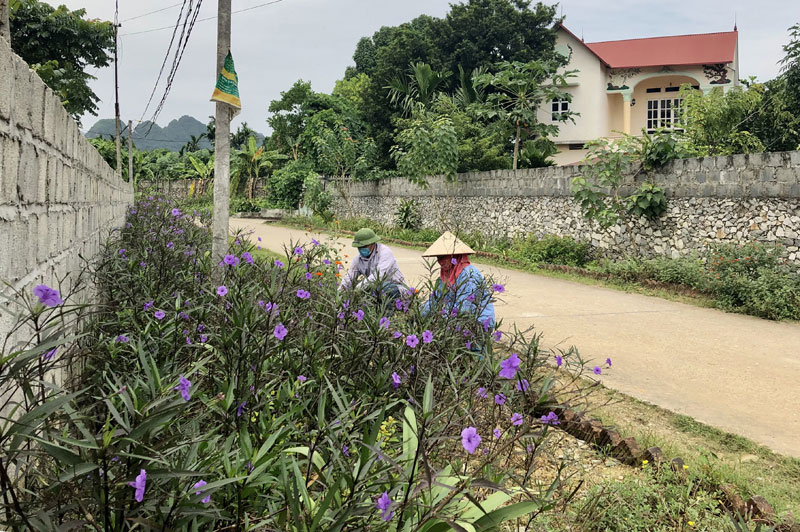
(HBO) - Thanh Ha village in Luong Son district’s Thanh Son commune has been recognised as a model new-style rural area. Coming to the village, we were impressed by the local hospitality, and clean and beautiful landscape.
 Thanh Ha residents grow flowers along the sides
of the road to create a clean, beautiful and green landscape.
Thanh Ha residents grow flowers along the sides
of the road to create a clean, beautiful and green landscape.
Tran Duc Manh, head of the village said this year Thanh Ha was honoured as it was selected
for building a model new-style rural area.
The village’s Party cell has paid special
attention to mass mobilisation and public communications work from the beginning,
he said, adding that the cell had assigned Party members to persuade each
family to participate in implementing criteria of a model new-style rural area.
As a result, local residents have joined in planting flowers along 1,000 m of
roads and concretising 1.5 km of roads.
The work has created a driving force for locals
to shakeup the structure of their crops and husbandry, apply technologies, and
replace low-value trees in their gardens with citrus trees which produce higher
economic value. Of the total 136 households in the village, 123 have renovated their
gardens. The village currently has nearly 90 hectares of citrus trees, with a
local garden of Tran Duc Hung and his family recognised as a model garden. In 2020,
the average per capita income of the village is estimated at 41 million VND
(1,775 USD), with no households rated as poor. Thanh Ha has seen 84.6 percent
of its households obtaining the cultural family tittle. The village has sustained
the title of cultural village since 2010.
The village has also focused on creating a green, clean, and beautiful landscape. All 136 households have access to hygienic drinking water. Among
101 households engaging in animal raising, 93 have built barns meeting environmental sanitation standards. Locals are now aware of the classification and treatment of
waste, while the local road system has drainage ditches. The discharge of garbage and pesticide bottles into rivers and streams is strictly
prohibited, while once a week, all villagers join
in cleaning the entire village./.
The Standing Board of the Hoa Binh provincial Party Committee has agreed in principle on a proposal by the Standing Board of the Party Committee of Hoa Binh city to gather feedback on the city’s 1:2000 zoning plan, which forms part of its broader urban development strategy.
Hoa Binh province has made notable progress in public administration reform and digital government development, with the satisfaction index among citizens and businesses reaching over 84%, according to recent government evaluations.
Thanks to great efforts by local authorities in recent times, the governance and public administration performance of Mai Chau district has been significantly improved.
In the afternoon of June 6, the Party Committee, the People's Council, the People's Committee and the Fatherland Front of Lac Son district solemnly held a meeting to celebrate the 139th anniversary of the district's founding (1886–2025) and the 79th anniversary of the establishment of the district's Party Committee (1946–2025). There was the attendance of Mr. Bui Van Thang, the Vice Chairman of the Provincial People's Council; Mr. Quach Tat Liem, the Vice Chairman of the Provincial People's Committee; Ms. Dang Bich Ngoc, the Deputy Head of the National Assembly Delegation of the province; as well as the former leaders of the province and district through various periods, who are the natives of the district.
Implementing the Politburo’s Resolution No. 57-NQ/TW on breakthroughs in science – technology, innovation, and digital transformation is a golden opportunity for the northern mountainous province of Hoa Binh to renew growth model, improve competitive edge and shorten digital gap.
Resolution 57-NQ/TW, issued by the Politburo on December 22, 2024, identifies sci-tech, innovation, and digital transformation as strategic breakthroughs to build a developed and prosperous nation. In Hoa Binh province, this spirit is not just a slogan, it’s being put into action through concrete initiatives that form a "new development triangle”: digital citizenship, digital economy, and digital administration.



 Thanh Ha residents grow flowers along the sides
of the road to create a clean, beautiful and green landscape.
Thanh Ha residents grow flowers along the sides
of the road to create a clean, beautiful and green landscape.